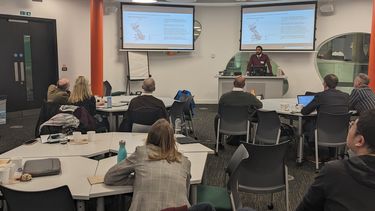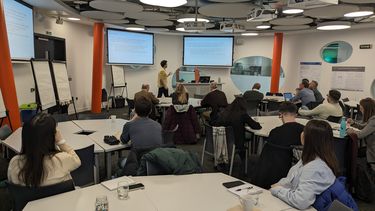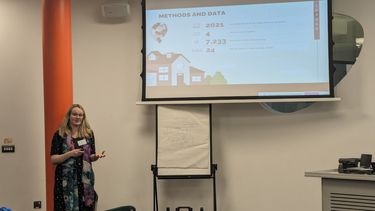On January 19th Dr Antonio Navas on behalf of the Sheffield Urban International Trade and Environmental (SUITE) Research Group at the Department of Economics at Sheffield, organized a workshop funded by the Royal Economic Society (RES) on the evolution of regional income disparities and the role played by geography, trade, and the environment.
The workshop opened with a session on regional aspects chaired by Professor Jesse Matheson. The first exciting presentation investigated the rise and death of British Industrial cities by Dr Yanos Zylberberg (Bristol). In this paper Dr Zylberberg studies what was the economic evolution of British cities over the last 200 years and what factors could have made them flourish or fall apart. In the same session Dr Marta Santamaria (Warwick) investigated what are the costs for taxpayers of the existence of home bias in the provision of public goods. She was looking not only at the national aspects of it but also at the regional aspects. A regional bias towards their own public goods could exacerbate regional income inequality as poor regions could potentially deliver poor public services which will have knock-on effects in the whole economy.
The next session, chaired by Dr Antonio Navas was started by Dr John Morrow (King’s College London). In his paper, he was looking at the regional aspects of R&D tax-credits. Dr Morrow was looking at to what extent does R&D tax credits create employment in the areas in which the receiving firms are located. In a further presentation, Professor Thiemo Fetzer, investigates the boundaries of the state, and how information could play a non-trivial role on the delivery of public policies. He analysed this in the context of the UK and German reactions to the energy crisis created by the Russian invasion of Ukraine.
During lunch, speakers engaged in stimulating discussions with members of the SUITE research group, and with our Ph.D. students that were presenting their research posters, receiving valuable feedback and comments about their research projects.
The following session chaired by Dr Eleni Stathopoulou started with the presentation of Professor Chris Timmins (Duke) that investigated to what extent do initiatives to reduce pollution in a certain area ends up damaging rather than benefiting the people that lives in that area. This is because reducing pollution may raise the price of the lettings displacing the original population leaving there (climate injustice). Finally Dr Amy K Binner (Exeter) and Prof. Gwilym B. Price (Sheffield) investigated whether there is discrimination to migrants in the real estate market. In an experiment in which the authors sent applications for rentals with names from different ethnic origins, the authors investigate across 6 cities whether there was a difference in positive responses across different ethnic groups.
Finally in a policy session chaired by Dr Enrico Vanino, Pranash Narayanan from the Institute for Public Policy Research provided an overview of how the manufacturing sector in the UK is coping with the net zero emissions target. Jagdeep Athwal from the Department of Business and Trade concluded with an on overview of the topics in which the Department of Business and Trade is currently interested in, in particularly related to the Levelling-Up agenda and the evolution of the UK trade relations post-Brexit.
The workshop was successful, bringing to Sheffield some of the top experts in these fields of economics, and stimulating fruitful discussions about future research streams and the policy implications of our research. We hope this will be the first of a long series of workshops and events organised by the SUITE research group.



